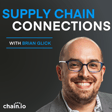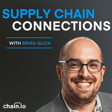
Episode 10 - Sarah Barnes-Humphrey of the "Let's Talk Supply Chain" Podcast
SUPPLY CHAIN CONVERSATIONS
—————————————————
EPISODE 10 - SARAH BARNES HUMPHREY, HOST OF THE "LET'S TALK SUPPLY CHAIN" PODCAST AND "THE TRADE SQUAD" ON YOUTUBE
—————————————————
Welcome to Profiles, a podcast centered around supply chain conversations hosted by Brian Glick, founder and CEO of Chain.io.
Our guest this week is SARAH BARNES-HUMPHREY.
EPISODE 10 - SARAH BARNES-HUMPHREY, with a firm background of working within the supply chain, Sarah is the host of the popular Let's Talk Supply Chain Podcast and The Trade Squad on YouTube. Sarah helps tell the stories and bring awareness to brands and hot topics in the industry which includes her infamous Women in Supply Chain series.
“…In sales you have internal customers and external customers. So every touch point with a customer or vendor or an internal or external stake holder, is really selling them on who you are and what you do.”
Listen in as Brian and Sarah discuss:
- The supply chain space is very much relationship driven, from vendor to customers. Will the automation of processes lead to better relationships?
- The major challenges faced when building a company and the lessons learned from that experience.
- How important is it to have experience when coming into the supply chain industry?
- What are some of the challenges people coming into the supply chain network in 2020 will face.
- Traditional thinking versus modern perspectives.
- Collaboration as a concept of ‘winning together’. Cultivating a victory mindset.
- Letting go of emotional responses to move towards revolutionising and automating the industry.
- Focus points for improving productivity in 2020 within your supply chain business.
“…My experience in operations and my experience in sales has really been able to help me define and pin point what those pain points were from both sides. Not just one side over the other.”
Resource mentioned in the show:
- letstalksupplychain.com
- https://www.linkedin.com/in/sarahbarnescitp/
- https://shipz.com/
- https://www.youtube.com/watch?v=y-sgnMyUfls
- TPM Conference
Subscribe to the podcast in iTunes or wherever you get your podcasts so that you’re updated when we post a new episode!
Take care, and until next time,
Brian Glick

